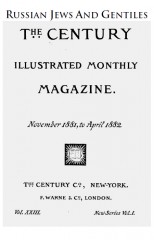
Author : Ragozin Zénaïde Alexeïevna
Title : Russian Jews and Gentiles From a Russian point of view
Year : 1881
Link download : Ragozin_Zenaide_Alexeievna_-_Russian_Jews_and_Gentiles.zip
The disturbances began at Ielizavetgrad, in the middle of the Easter week. How did they begin? On what provocation? The immediate occasion was too trifling to have been more than a pretense, a signal for something long impending. The first three holidays had passed over quietly, when, on the afternoon of Easter Wednesday, a quarrel took place at a much-frequented public-house on account of a broken drinking-glass, for which the offender refused to pay. The tavern-keeper, who was a Jew, from angry remonstrances passed to blows. A voice from the crowd around the bar was heard to shout: “They assault our people!” The uproar quickly spread along the street, and, in a few minutes, there was a mob of not less than a thousand men, which carried the news and the excite-ment from end to end of the city. The work of destruction began immediately, and raged all through the night and through the following day and evening, as late as midnight, when it stopped—not so much from fear of the troops who had been telegraphed for and only then had arrived, as because scarcely anything was left to destroy. To realize the extent of the ravages done, it must be kept in mind that Ielizavetgrad, situated on the highway between Poltava and Odessa, is a great commercial thoroughfare and a very wealthy city, with a population of forty-five thousand, of which fully one-third are Jews. The authorities were wholly unprepared. The ordinary police force was far too small to be of any use, and of the military only four squadrons, of cavalry were on hand—a force par-ticularly ill-suited for action in narrow, crowded streets—not quite five hundred men in all against a mob of many thousands, half of them women and children. It was a good-natured mob, too, which did not provoke violence by resistance, but dispersed at the first collision; but the broken groups would join again some streets further off, and carry their devastations to other quarters where the field was still clear. As for the citizens of the better classes, they, of course, took no part in the proceedings,—but they did nothing to oppose them. Num-bers followed the different mobs out of curiosity, as mere lookers-on. A certain secret sympathy with the rioters could even be detected, which the latter were not slow in perceiving, and acknowledged by sundry marks of friendly atten-tion. Thus, on the “bazaar,” or market-place, the ground being very wet and muddy, they spread it with carpets and woolen materials dragged out of the shops, at the same time politely inviting the spectators “to approach, as they need not lie afraid of soiling their nice shoes.” The citizens would probably not have preserved this passive attitude had the rioters shown themselves at all cruelly inclined, and threatened the persons of the Jews instead of venting their rage only on their property. But, as it was, the worst instincts of a mob were not called into play, in great part owing to the prudence of the Jews themselves, who mostly kept out of sight. Had they “shown fight” at all, matters might have taken a more tragical turn, for the rioters gave signs of manifest irritation in the rare instances when revolvers were fired, very harmlessly, from windows. Crowds of women and children, and townspeople of the poorer sort, followed in their wake, picking up and carrying away all they could of the valuable property which covered the ground, or lay piled in mud-bespattered heaps, and literally could be had, not for the asking, but for the taking. A noteworthy feature, and one that shows how entirely the actors were mastered by one feeling, that of animosity toward the Jews, is that the rioters—mostly workmen, handicrafts-men, and peasants from the environs—did not take anything for themselves; they merely destroyed. Some shop-keepers and householders tried to ransom their goods with sums of money. One gave a thousand rubles, another two thousand; many gave a hundred and fifty or two hundred. The rioters took the money, but only to fling the coin away and tear the paper to shreds, and then went on with their work. The only temptation which they could not resist was whiskey (vodka). In the cellars of wholesale spirit-warehouses, every barrel was staved in or the faucets were taken out, till the whiskey stood several feet deep and the barrels actually swam. Three men were saved from drowning only by the timely assistance of the soldiers. Many lay senseless about the streets, and were picked up in that condition hours afterward. 1 Yet, on the whole, the mob behaved—for a mob—with remarkable coolness and discrimination. Not a sin-gle Russian house or shop was touched, even by mistake, although protected only by crosses in white chalk on the doors and shutters, and occasionally by some saints' images (ikonas) and Easter loaves placed in the windows—a device which was found so efficient that the Jews did not fail to adopt it in other towns, where many saved their houses by it. Jews living in Christian houses were not molested; neither were Hebrew physicians and lawyers, they being considered useful members of society. Exceptions were made in favor of well-recommended individuals. Thus, at the door of one house belonging to a Jew, the mob is confronted by the porter: “Boys” says he, “leave him alone! He is a good man, and often gives you work. I have been ten years in his service.” “All right!” say the rioters, and pass on. When the outrages were stopped at last, and the excitement had worn itself out, the city presented the strangest, wildest aspect. The streets were as white as after a fall of snow; for one of the mob's chief amusements had been to rip up every feather-bed and pillow they came across, and fling out the contents. The wooden houses were shattered, the furniture broken to pieces and left in heaps, mingled with kitchen utensils and household goods of every kind. Here might be seen the hulk of a grand piano, with lid and legs wrenched off and strings hanging out; further on, fine mahogany reduced almost to chips, with velvet rags still clinging to them, and close to that the débris of painted furniture of the commonest description. Not a pane of glass, not a window frame, not a door was left whole. Inside the houses the same ravages had been committed every-where, with methodical regularity; every object, even the smallest, was broken or spoiled for use; the very stoves were demolished; nothing escaped destruc-tion. ...

Gaidoz Henri - Etudes de mythologie gauloise
Auteur : Gaidoz Henri Ouvrage : Etudes de mythologie gauloise Année : 1886 Lien de téléchargement :...














